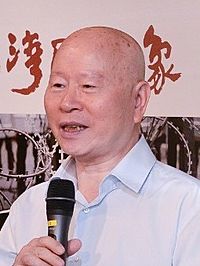Hsu Hsin-liang facts for kids
Quick facts for kids
Hsu Hsin-liang
|
|
|---|---|
|
許信良
|
|

Hsu in 1992
|
|
| 4th and 6th Chairman of the Democratic Progressive Party | |
| In office 18 July 1996 – 18 July 1998 |
|
| Preceded by | Chang Chun-hung (acting) |
| Succeeded by | Lin Yi-hsiung |
| In office 20 January 1992 – 4 December 1993 |
|
| Preceded by | Huang Shin-chieh |
| Succeeded by | Shih Ming-teh |
| Magistrate of Taoyuan | |
| In office 20 December 1977 – 1 July 1979 |
|
| Preceded by | Wu Po-hsiung Weng Chien (acting) |
| Succeeded by | Yeh Kuo-kuang (acting) Hsu Hung-chih |
| Personal details | |
| Born | 27 May 1941 Chūreki Town, Chūreki District, Shinchiku Prefecture, Japanese Taiwan (modern-day Zhongli, Taoyuan, Taiwan) |
| Nationality | |
| Political party | Democratic Progressive Party (1990s; 2008–present) |
| Other political affiliations |
Taiwan Revolutionary Party (1984–1986) Kuomintang (until 1977; 2000–2008) |
| Spouse | Hsu Chung Pi-hsia |
| Relations | Hsu Kuo-tai (brother) |
| Education | National Chengchi University (BA) University of Edinburgh (MA) |
Hsu Hsin-liang (born May 27, 1941) is a well-known politician from Taiwan. He once led the Democratic Progressive Party (DPP) as its chairman. For a time, he supported the Pan-Blue Coalition, a group of political parties. However, he later returned to supporting the DPP.
Contents
Early Life and Education
Hsu Hsin-liang was born in Chūreki, which was part of Japanese Taiwan. Today, this area is known as Zhongli District in Taoyuan City, Taiwan. He went to Hsinchu Senior High School.
He earned his first degree in political science from National Chengchi University in 1967. Later, he received a master's degree from the University of Edinburgh in 1969.
Political Journey
Hsu Hsin-liang started his political career with the Kuomintang party. From 1973 to 1977, he was a member of the Taiwan Provincial Assembly. This was a group that helped govern Taiwan.
Becoming a Magistrate
In 1977, he decided to run for a new position. He wanted to be the Magistrate of Taoyuan County. A Magistrate is like a mayor or governor for a county. He ran as an independent candidate, meaning he was not officially part of a political party. He won the election.
During this election, an event called the Zhongli incident happened. Voters reported that an official from the Kuomintang party was destroying ballots. This caused protests and showed the public's desire for fair elections.
Leaving Taiwan and Returning
In 1979, Hsu Hsin-liang was removed from his office. He was then sent out of Taiwan and moved to the United States. While in the U.S., he continued to speak out against the Kuomintang government.
In 1986, the Democratic Progressive Party (DPP) was formed in Taiwan. Hsu tried to return to Taiwan, but he was stopped at the airport many times. Three years later, in 1989, he managed to enter Taiwan secretly. He was arrested and put in jail. However, he was later set free by President Lee Teng-hui in 1990.
Leading the DPP
After his release, Hsu Hsin-liang joined the DPP. He became the party's chairman twice. His first term was from 1991 to 1993. His second term was from 1996 to 1998.
As chairman, he wanted to make the DPP a more moderate party. He hoped it would appeal to more voters. He tried to shift the party away from immediately seeking Taiwan independence.
Hsu tried to become the DPP's candidate for president twice. In 1996, he lost the party's primary election. In 1999, the party chose Chen Shui-bian instead. After these attempts, Hsu decided to leave the DPP in 1999.
Presidential Election and Later Views
In the 2000 Republic of China presidential election, Hsu Hsin-liang ran as an independent candidate. He believed that having a good relationship with mainland China was important for Taiwan's economy.
After the 2000 election, Hsu became more critical of the government led by Chen Shui-bian. He felt that building stronger economic ties across the Taiwan strait would help Taiwan grow.
In 2004, Hsu supported other candidates in the 2004 Republic of China presidential election. He also joined other politicians to publish a statement. They urged voters not to support Chen Shui-bian, hoping he would reflect on his actions.
After the 2004 election, Hsu Hsin-liang protested what he saw as an unfair election. He went on a hunger strike for three days. He believed he was fighting for democracy, just as he had done years before.
In July 2004, he started the Taiwan Democratic School. This group aimed to support Taiwan's democracy. In 2008, Hsu became concerned about the Kuomintang party. He then decided to support the DPP candidate, Frank Hsieh, in the presidential election. Since then, he has continued to support the DPP. In 2011, he tried to become the DPP's candidate for the 2012 presidential election but was not chosen. He also ran for DPP chairperson in 2012 but lost.
Cross-Strait Relations
In 2013, Hsu Hsin-liang spoke about the relationship between Taiwan and mainland China. He suggested that they should have political talks. He believed these talks were important to help Taiwan's economy. He felt that talking with Beijing was not just for politics, but to help Taiwan's economic future.
 | Misty Copeland |
 | Raven Wilkinson |
 | Debra Austin |
 | Aesha Ash |

